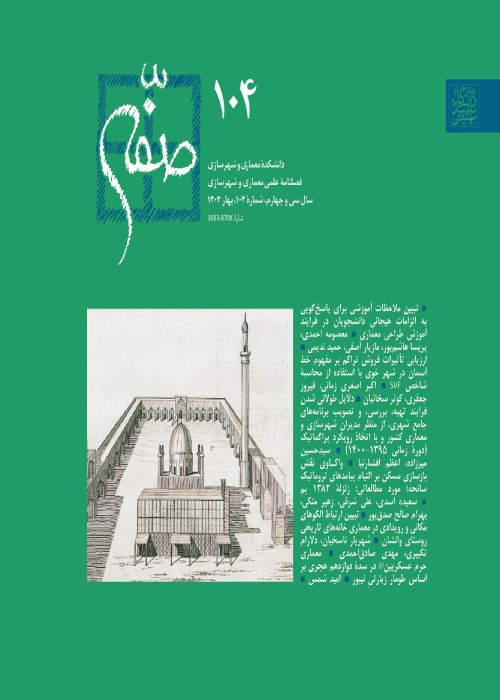Tracing Factors Influencing Knowledge Places; with A Focus on Tehran
Author(s):
Abstract:
Professor Emeritus, Faculty of Architecture and Urban Planning, Shahid Beheshti University
The transition from an industrial era based on material production methods, into a knowledge era based on knowledge production has fundamentally changed the economy of cities, giving rise to a knowledge economy on the cusp of the 21st century.
Based on the production, distribution and use of knowledge and information aimed at providing products and services through knowledge-intensive activities Knowledge economy demands new urban spaces different from those required by the material-based production. The knowledge-based production demands urban knowledge places for the exchange of ideas and transforming them into innovative products, services and solutions. The creation of such knowledge places involves a long and complicated process influenced by various factors. In spite of the importance of them in the formation and success of a knowledge-based economy as a driving force for socioeconomic development, the creation of such places has not been given due consideration in Tehrans research, planning and policy-making, and their influencing factors are left unexplored.
In response, the present study focuses on the exploration of the factors influencing the performance of Tehrans knowledge places, and their prospective role in knowledge economy. To this end, using the documentary research method and the systematic literature review, the theoretical foundations associated with knowledge places and the factors influencing their performance have been traced, providing a framework for the analysis of those factors for the city of Tehran. Data were collected using semi-structured interviews with stakeholders of science and technology parks across Tehran, and analysed using the deductive qualitative content analysis based on a qualitative research approach.
The results show that in line with global efforts to make use of the opportunities provided by knowledge economy, attempts have been made to develop knowledge-based activities and the locations required for such activities in Tehran. Despite the fragmented nature of such efforts, and that knowledge places in Tehran are not comparable to their counterparts elsewhere, it would still be possible to enhance the performance of knowledge places and exploit knowledge opportunities in Tehran through improving the knowledge production infrastructure such as those investigated in this paper, transforming the nature of the activities of the units located in knowledge places into innovative activities, and enhancing their innovation potential, as well as their mutual cooperation, strengthening the legal framework supporting knowledge-based activities, and developing a market for innovative products for the city.
The transition from an industrial era based on material production methods, into a knowledge era based on knowledge production has fundamentally changed the economy of cities, giving rise to a knowledge economy on the cusp of the 21st century.
Based on the production, distribution and use of knowledge and information aimed at providing products and services through knowledge-intensive activities Knowledge economy demands new urban spaces different from those required by the material-based production. The knowledge-based production demands urban knowledge places for the exchange of ideas and transforming them into innovative products, services and solutions. The creation of such knowledge places involves a long and complicated process influenced by various factors. In spite of the importance of them in the formation and success of a knowledge-based economy as a driving force for socioeconomic development, the creation of such places has not been given due consideration in Tehrans research, planning and policy-making, and their influencing factors are left unexplored.
In response, the present study focuses on the exploration of the factors influencing the performance of Tehrans knowledge places, and their prospective role in knowledge economy. To this end, using the documentary research method and the systematic literature review, the theoretical foundations associated with knowledge places and the factors influencing their performance have been traced, providing a framework for the analysis of those factors for the city of Tehran. Data were collected using semi-structured interviews with stakeholders of science and technology parks across Tehran, and analysed using the deductive qualitative content analysis based on a qualitative research approach.
The results show that in line with global efforts to make use of the opportunities provided by knowledge economy, attempts have been made to develop knowledge-based activities and the locations required for such activities in Tehran. Despite the fragmented nature of such efforts, and that knowledge places in Tehran are not comparable to their counterparts elsewhere, it would still be possible to enhance the performance of knowledge places and exploit knowledge opportunities in Tehran through improving the knowledge production infrastructure such as those investigated in this paper, transforming the nature of the activities of the units located in knowledge places into innovative activities, and enhancing their innovation potential, as well as their mutual cooperation, strengthening the legal framework supporting knowledge-based activities, and developing a market for innovative products for the city.
Keywords:
Language:
Persian
Published:
Soffeh, Volume:27 Issue: 79, 2018
Page:
57
magiran.com/p1844025
دانلود و مطالعه متن این مقاله با یکی از روشهای زیر امکان پذیر است:
اشتراک شخصی
با عضویت و پرداخت آنلاین حق اشتراک یکساله به مبلغ 1,390,000ريال میتوانید 70 عنوان مطلب دانلود کنید!
اشتراک سازمانی
به کتابخانه دانشگاه یا محل کار خود پیشنهاد کنید تا اشتراک سازمانی این پایگاه را برای دسترسی نامحدود همه کاربران به متن مطالب تهیه نمایند!
توجه!
- حق عضویت دریافتی صرف حمایت از نشریات عضو و نگهداری، تکمیل و توسعه مگیران میشود.
- پرداخت حق اشتراک و دانلود مقالات اجازه بازنشر آن در سایر رسانههای چاپی و دیجیتال را به کاربر نمیدهد.
In order to view content subscription is required
Personal subscription
Subscribe magiran.com for 70 € euros via PayPal and download 70 articles during a year.
Organization subscription
Please contact us to subscribe your university or library for unlimited access!


